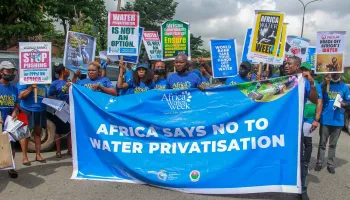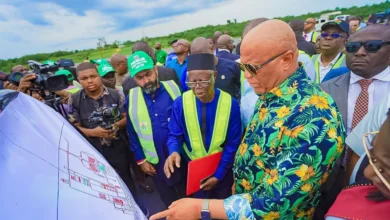
Communities impacted and those under threat of water privatization across Africa have called on African governments to jettison water privatization and return privatized water systems to localities, as public utility concerns for affordable and equitable management.
Local communities in Nigeria, Mozambique, Senegal, Ghana, Cameroon, Kenya, Gabon, Uganda and other African countries are making this their focal demand as they mark the second edition of Africa Week of Action Against Water Privatization, which holds from October 11, 2022 to October 14, 2022 to coincide with annual meetings of the World Bank and International Monetary Fund (IMF).
The communities, working in collaboration with civil society and labour groups under the aegis of the Our Water Our Right Africa Coalition will hold town hall meetings, community engagements, press briefings, protest marches, meetings with policy makers and engagements to insist on their opposition to water privatization schemes and the commodification of water, promoted by the World bank and other International Financial Institutions, notably the World Bank and IMF, which continue to deprive communities their right to existence. In some communities, water has been priced out of the reach of locals, forcing women and young girls to go the extra mile, including exposing themselves to dangers to get water for their basic needs.
The communities, working in concert with civil society groups and organized labour, insist that while water remains one of the most fundamental necessities for life, giant corporations like Veolia and Suez, backed by international financial institutions like the World Bank are exploiting this basic need by trying to privatize water across the African continent, threatening to leave millions of people in communities suffering without water.
Executive Director of Corporate Accountability and Public Participation Africa (CAPPA), Akinbode Oluwafemi, who explained the significance of the 2022 commemoration, said: “When communities are deprived of a basic right which guarantees their existence and the bond that has kept them connected with their culture and spirituality for generations will ultimately cease to exist.
“That is why communities are leading the resistance to what corporations like Veolia and the World Bank are marketing on the African continent. But the message is very clear. We do not want our water systems privatized.”
Read Also: Senate orders stoppage of tankers from lifting crude oil over taxation
On the impacts of water privatization on communities, Sani Baba Mohammed, Regional Secretary for Africa & Arab Countries at Public Services International said: “Communities are the guardians of our heritage. The streams and rivers and brooks that have fed generations are in the communities. Taking it from them under any guise is tantamount to robbing them of their patrimony. What the communities want is democratically – controlled, a system that gives them a say.”
The inaugural Africa Week of Action Against Water Privatization, which held from October 11, 2021 to October 15, 2021 was spearheaded by civil society and labour groups on the continent. The high point was the launch of a report titled: _Africa Must Rise and Resist Water Privatization_, which detailed how privatization has become the most potent threat to Africans’ right to water.
It cited water privatization failures in the United States, Chile and France as vital lessons for African governments being pressured by the World Bank and other multilateral financial institutions to toe the privatization path. The Portuguese and French versions of the report will be unveiled at a press briefing on October 11 where stories and
realities of African communities will be showcased in videos to begin the week of action.
The communities are demanding that their governments halt privatization plans and instead, invest in public water systems that include meaningful public participation in water governance, with particular focus on the perspectives of those typically left out of decision-making processes, including, but not limited to women, low-income earners and rural communities.
Follow The Trumpet on all our social media platforms for more updates:




